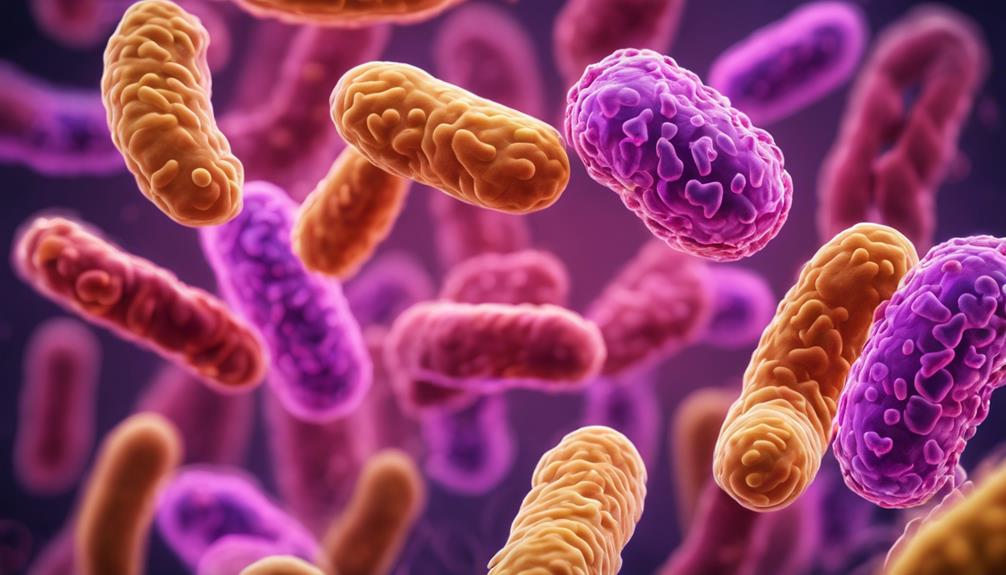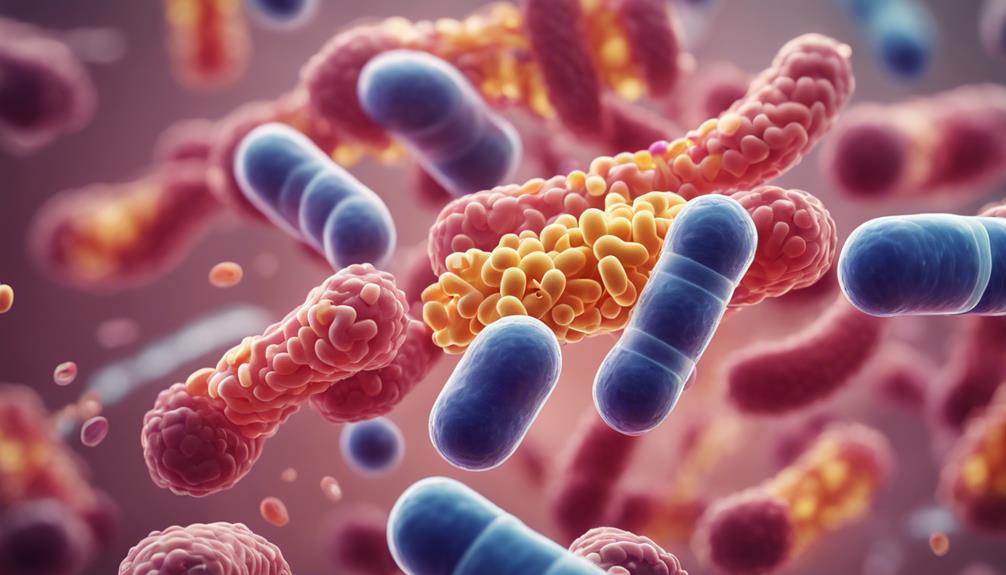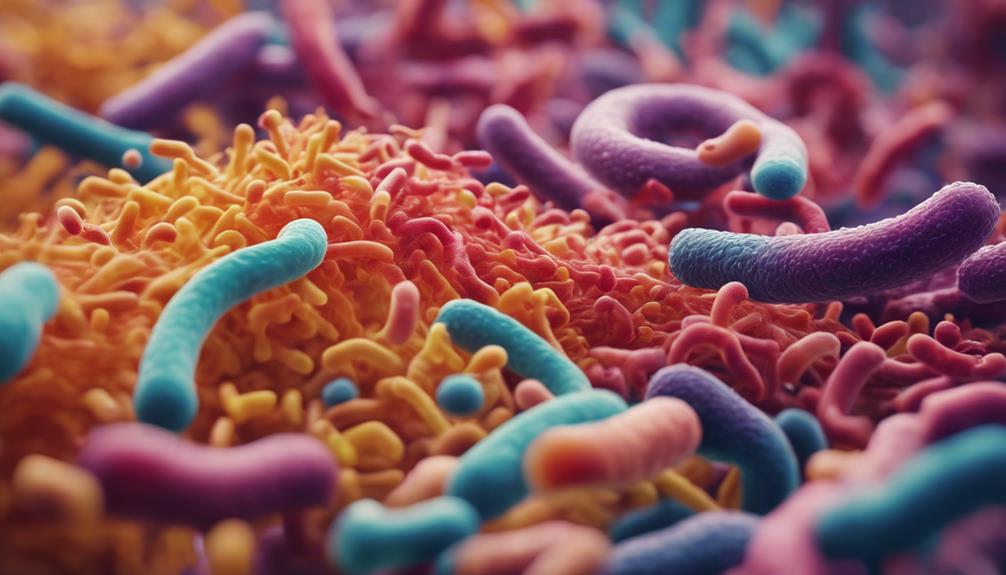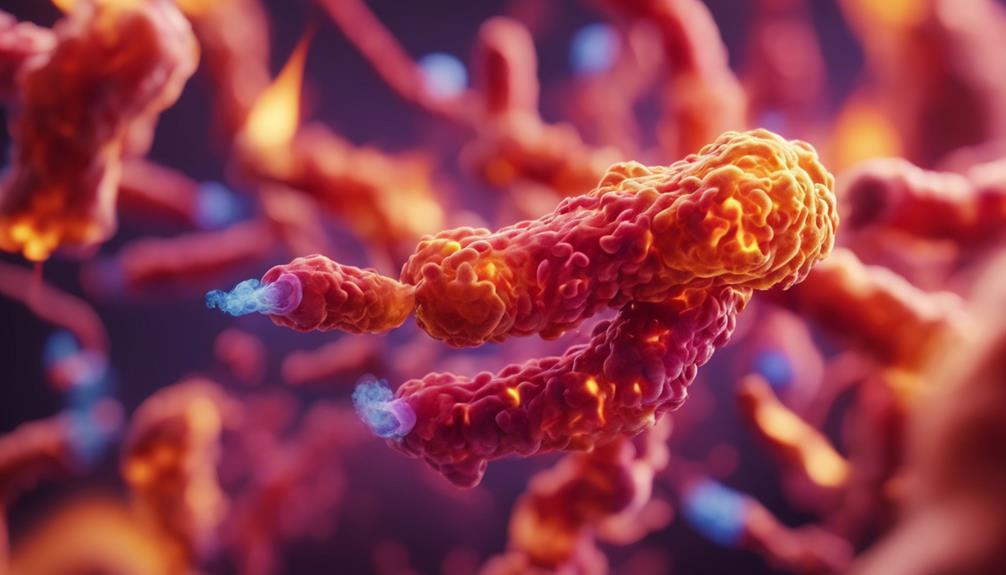The Role of Probiotics in Digestive Health
Within the intricate ecosystem of your gut, probiotics act as diligent gardeners, tending to the balance and health of your digestive system. But, did you know that these tiny helpers do much more than that?
Exploring the depths of probiotics' impact on your gut health might just unveil a world of benefits you never knew existed.
Let's unravel the mysteries behind probiotics and their vital role in digestive well-being.
Key Takeaways
- Probiotics balance gut flora for optimal digestion and nutrient absorption.
- Enhance immune function by modulating inflammatory responses.
- Probiotic diversity supports overall gut health and well-being.
- Sources like yogurt, kefir, and supplements aid in maintaining a healthy gut microbiome.
Understanding Probiotics
To understand probiotics better, it's essential to grasp the concept of how these beneficial bacteria work in your digestive system. Probiotic strains are specific types of live bacteria and yeasts that are good for your health, especially your digestive system. These microorganisms help maintain the delicate balance of your gut microbiota, which is crucial for proper digestion and overall well-being.
Different probiotic strains have varying functions and benefits. Some strains, like Lactobacillus and Bifidobacterium, are commonly found in probiotic supplements and fermented foods. They aid in breaking down food, absorbing nutrients, and supporting your immune system. By promoting gut balance, probiotics can help prevent digestive issues such as bloating, gas, and constipation.
Maintaining a diverse and thriving gut microbiota is essential for optimal health. Probiotics play a key role in this by replenishing and supporting the beneficial bacteria in your gut. By incorporating probiotic-rich foods or supplements into your diet, you can support your digestive system and overall wellness.
Importance of Gut Microbiota
The gut microbiota, composed of trillions of microorganisms, plays a vital role in maintaining your digestive health and overall well-being. These tiny organisms impact various aspects of your health, from digestion to immunity and even mental well-being through the gut-brain connection. Achieving a balance in your microbiome is crucial for optimal gut health and overall wellness. One key factor in maintaining this balance is probiotic diversity, which refers to the variety of beneficial bacteria present in your gut.
To understand the importance of gut microbiota better, let's explore its implications on gut health in a more relatable way:
| Gut Health Implications | Probiotic Diversity |
|---|---|
| Supports Digestion | Increases beneficial bacteria |
| Boosts Immune System | Enhances gut microbial community |
| Affects Mental Health | Improves overall gut health |
Probiotics Vs. Prebiotics
Comparing probiotics and prebiotics can help you understand their distinct roles in supporting gut health. Probiotics are live microorganisms that provide health benefits when consumed in adequate amounts. On the other hand, prebiotics are non-digestible fibers that stimulate the growth or activity of beneficial bacteria in the gut. Here are three key points to consider when comparing probiotics and prebiotics:
- Probiotics for Weight Loss: Some studies suggest that certain probiotic strains may help with weight loss by influencing the gut microbiota and affecting energy metabolism. However, more research is needed to fully understand the mechanisms behind this potential benefit.
- Probiotic Supplements: Probiotic supplements are available in various forms such as capsules, powders, and drinks. These products contain specific strains of live bacteria that are believed to confer health benefits when consumed regularly.
- Prebiotics Support Gut Health: While probiotics introduce beneficial bacteria into the gut, prebiotics act as food for these bacteria, helping them thrive and improve the balance of the gut microbiota. Including prebiotic-rich foods like bananas, onions, and garlic in your diet can promote gut health.
How Probiotics Work
Indispensable to understanding the benefits of probiotics is grasping their mechanism of action in the gut. Probiotics work by influencing the balance of good and bad bacteria in the digestive system through various mechanisms. Research suggests that probiotics can help maintain gut health by directly interacting with the microbiome present in your intestines. These beneficial bacteria can compete with harmful microbes, preventing their growth and colonization within the gut.
Probiotic mechanisms involve enhancing the gut barrier function, which acts as a protective shield against pathogens and toxins. Moreover, probiotics have been shown to modulate the immune response in the gut, promoting a balanced inflammatory reaction and improving overall gut health. These actions are supported by scientific research that continues to unveil the intricate ways in which probiotics work within the digestive system.
Understanding these probiotic mechanisms and their impact on gut health is crucial for harnessing the full potential of these beneficial bacteria in maintaining a healthy digestive system.
Benefits for Digestive System
To fully appreciate the benefits probiotics offer your digestive system, understanding their positive impact on gut health is essential. Probiotics play a crucial role in maintaining a healthy balance of gut flora, which are the microorganisms living in your intestines. These beneficial bacteria help in various ways, such as aiding in digestion and nutrient absorption. Additionally, probiotics support the production of digestive enzymes, which are essential for breaking down food and ensuring optimal nutrient uptake.
Here are three key benefits of probiotics for your digestive system:
- Balancing Gut Flora: Probiotics help maintain a healthy balance of beneficial bacteria in your gut, which is vital for proper digestion and overall gut health.
- Enhancing Digestive Enzyme Production: Probiotics support the production of digestive enzymes, which are essential for breaking down food into nutrients that your body can absorb.
- Improving Nutrient Absorption: By promoting a healthy gut environment and aiding in the breakdown of food, probiotics help improve the absorption of essential nutrients, promoting overall digestive wellness.
Impact on Immune Function
To understand how probiotics influence your overall health, it's important to explore their impact on immune function, which is closely linked to digestive well-being. Probiotics play a crucial role in immune modulation, helping to balance and strengthen your body's immune response. These beneficial bacteria interact with your immune system in the gut, where a significant portion of immune activity occurs. By promoting a healthy gut barrier, probiotics help prevent harmful substances from leaking into the bloodstream and triggering inflammatory responses that can compromise immune function.
Research suggests that probiotics can enhance the production of immune cells, regulate inflammatory pathways, and support the body's defense mechanisms against pathogens. By maintaining a healthy balance of gut bacteria, probiotics contribute to a robust immune system that can effectively ward off infections and maintain overall wellness. Remember, a balanced immune system is essential for optimal health, and probiotics offer a natural way to support your body's defense mechanisms.
Probiotics and Inflammation
Exploring the relationship between probiotics and inflammation reveals how these beneficial bacteria can help regulate and reduce inflammatory responses in the body. When it comes to gut health, probiotics play a vital role in maintaining balance and promoting overall well-being.
Here are three key points to consider:
- Gut-Brain Axis: Probiotics have been shown to communicate with the gut-brain axis, the connection between the gut and the brain. This communication pathway can influence inflammatory responses throughout the body, highlighting the importance of a healthy gut microbiome in managing inflammation.
- Immune Modulation: Probiotics have the potential to modulate immune responses, including reducing inflammation. By promoting a balanced immune system, probiotics can help prevent excessive inflammation, which is linked to various chronic conditions.
- Benefits of Probiotic Therapy: Incorporating probiotic-rich foods or supplements into your diet can support the body's natural anti-inflammatory mechanisms. Probiotic therapy has shown promise in alleviating symptoms of inflammatory disorders and promoting overall digestive health.
Types of Probiotic Strains
Understanding the diverse types of probiotic strains available is essential for optimizing digestive health and overall well-being. Probiotic diversity refers to the wide range of beneficial bacteria strains that can positively impact your gut health. Each strain offers unique benefits, highlighting the importance of strain specificity in achieving desired health outcomes. Lactobacillus and Bifidobacterium are common genera of probiotics, with various species like Lactobacillus acidophilus and Bifidobacterium lactis known for their digestive support.
Different strains have specific functions, such as aiding in nutrient absorption, supporting the immune system, or promoting regular bowel movements. For instance, Lactobacillus casei has been associated with reducing symptoms of irritable bowel syndrome. On the other hand, Bifidobacterium breve may help alleviate constipation.
When selecting a probiotic supplement, consider your individual needs and choose a product containing strains that target your specific concerns. By understanding probiotic diversity and strain specificity, you can harness the full potential of these beneficial bacteria for improved digestive health.
Sources of Probiotics
For a well-rounded approach to incorporating probiotics into your diet, it's essential to explore the diverse sources from which you can obtain these beneficial bacteria. When looking to increase your intake of probiotics, you can consider the following options:
- Probiotic Foods: These are natural sources of probiotics that have undergone fermentation. Foods like yogurt, kefir, sauerkraut, kimchi, miso, and tempeh are rich in probiotic strains such as Lactobacillus and Bifidobacterium. Including these foods in your daily diet can help maintain a healthy balance of gut bacteria.
- Probiotic Supplements: If you find it challenging to consume enough probiotic-rich foods, supplements can be a convenient alternative. Probiotic supplements come in various forms such as capsules, tablets, or powders, containing concentrated amounts of live bacteria strains. It's important to choose supplements from reputable brands that ensure the viability of the bacteria until the expiration date.
Incorporating Probiotics in Diet
To optimize your digestive health, incorporating probiotics into your diet plays a crucial role in maintaining a balanced gut microbiome. Probiotics are live bacteria and yeasts that are beneficial for your digestive system. You can find probiotics in fermented foods like yogurt, kefir, sauerkraut, and kimchi. These foods can be delicious additions to your meals while promoting gut health. If you're looking for probiotic recipes, consider making your own yogurt or kombucha at home.
In addition to incorporating probiotic-rich foods, you may also consider probiotic supplements to ensure an adequate intake of these beneficial microorganisms. When choosing a probiotic supplement, look for one that contains a variety of strains to support overall gut health. However, remember that supplements shouldn't replace a healthy diet filled with probiotic foods.
Maintaining a healthy lifestyle through regular exercise, stress management, and proper hydration also supports gut health. By making these healthy lifestyle choices and incorporating probiotics into your diet, you can help promote a diverse and thriving gut microbiome for optimal digestive health.
Probiotics for Specific Conditions
In exploring the impact of probiotics on specific health conditions, consider how these beneficial microorganisms can contribute to managing and improving various digestive issues. Probiotics have shown promise in addressing a range of conditions beyond general digestive health. Here are three key areas where probiotics can make a difference:
- Probiotics for Allergies: Research suggests that certain probiotic strains may help regulate the immune response related to allergies, potentially reducing symptoms like sneezing, itching, and congestion.
- Probiotics for Weight Loss: Some studies indicate that specific probiotics could support weight management by influencing gut bacteria linked to metabolism and fat storage. Incorporating these probiotics into your routine may aid in weight loss efforts.
- Probiotics for IBS and Skin Health: Evidence suggests that probiotics may offer relief for irritable bowel syndrome (IBS) symptoms by promoting gut health. Additionally, certain probiotic strains have shown potential in alleviating skin conditions like eczema, acne, and rosacea by modulating inflammation and enhancing skin barrier function.
Consider incorporating probiotics tailored to these specific conditions to explore their potential benefits for your digestive and overall well-being.
Considerations for Probiotic Supplementation
When considering probiotic supplementation, it's essential to understand the factors that influence their effectiveness and optimal usage. Probiotic dosages play a crucial role in determining the benefits you may experience. Different probiotic strains have varying optimal dosages, so it's important to follow the recommended guidelines provided by healthcare professionals or the product packaging.
Additionally, be mindful of probiotic interactions. Some probiotics may interact with medications or other supplements you're taking, affecting their efficacy. It's advisable to consult with your healthcare provider before starting probiotic supplementation, especially if you have underlying health conditions or are on medication.
To maximize the benefits of probiotics, consistency is key. Taking probiotics regularly and at the right time can help maintain a healthy balance of gut bacteria. Remember that individual responses to probiotics can vary, so it may take some time to notice any improvements in digestive health. By being informed about probiotic dosages and interactions, you can make more informed decisions about incorporating them into your wellness routine.
Frequently Asked Questions
Can Probiotics Help With Skin Conditions Like Acne or Eczema?
Probiotics research suggests a gut-skin connection. Incorporating probiotics may help with skin conditions like acne or eczema. Consider adding these beneficial bacteria to your routine after consulting with a healthcare professional for personalized advice.
Are There Any Potential Side Effects of Taking Probiotics?
When considering potential risks of probiotics, be aware of allergies or intolerances. Long-term effects vary, so monitor how your body responds. Remember, "Better safe than sorry" when exploring the benefits and drawbacks.
Can Probiotics Be Beneficial for Mental Health Conditions Like Anxiety or Depression?
Probiotics can benefit mental health by influencing the gut-brain axis and microbiome connection. They may help manage anxiety and depression by reducing stress through microbiota modulation. Remember to consult a healthcare professional for personalized advice.
How Do Probiotics Interact With Medications or Other Supplements?
When taking medications or supplements, probiotics can interact in various ways. They might affect drug absorption or alter the effectiveness of certain medications. Always consult with your healthcare provider to ensure compatibility and avoid potential interactions.
Are There Specific Probiotic Strains That Are More Effective for Certain Digestive Issues Like Irritable Bowel Syndrome or Crohn's Disease?
When dealing with digestive disorders like IBS or Crohn's disease, certain probiotic strains can offer relief. Research on the gut-brain connection supports this. Selecting probiotics tailored to your condition can be beneficial.
Conclusion
So, now you understand the key role probiotics play in maintaining a healthy digestive system.
While some may argue that probiotics are just a passing trend, studies consistently show their benefits in promoting gut health.
By incorporating probiotic-rich foods or supplements into your diet, you can support your gut microbiota and improve digestion.
Remember, a happy gut leads to a happier you!













